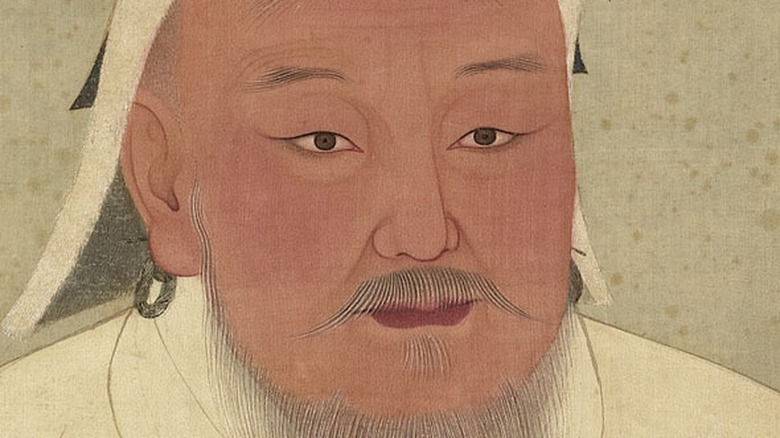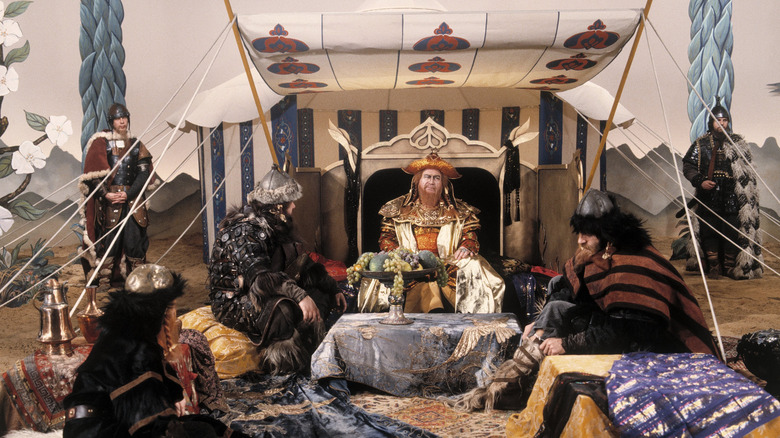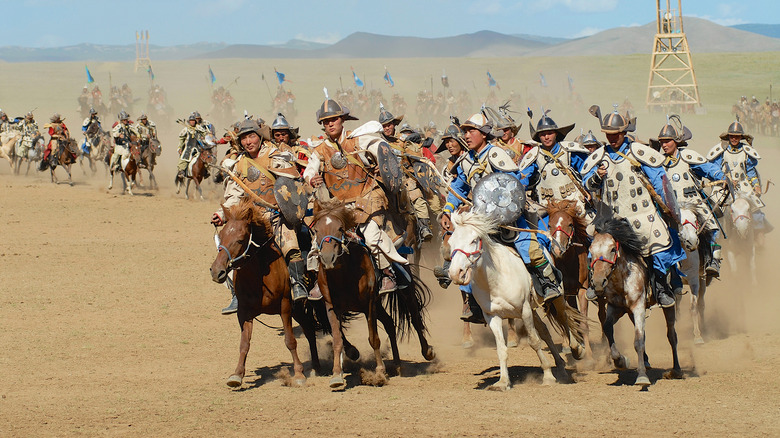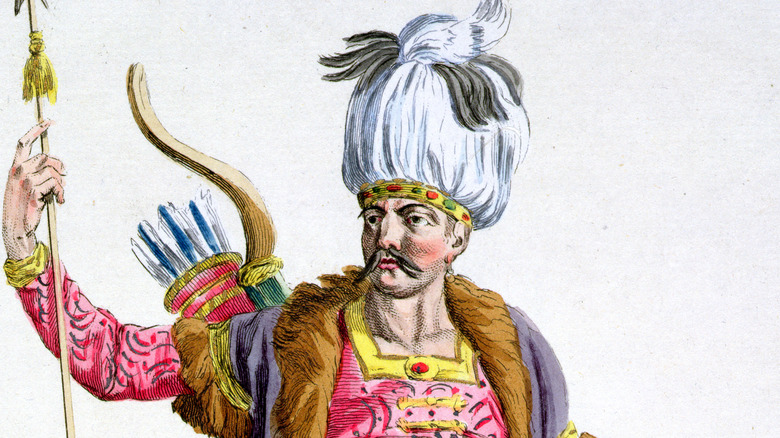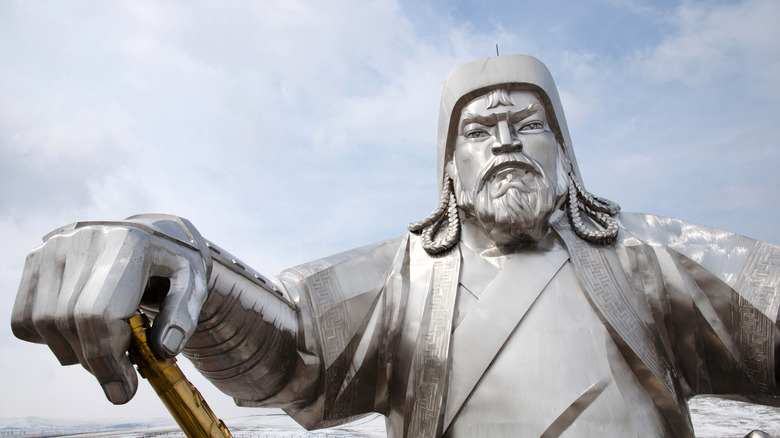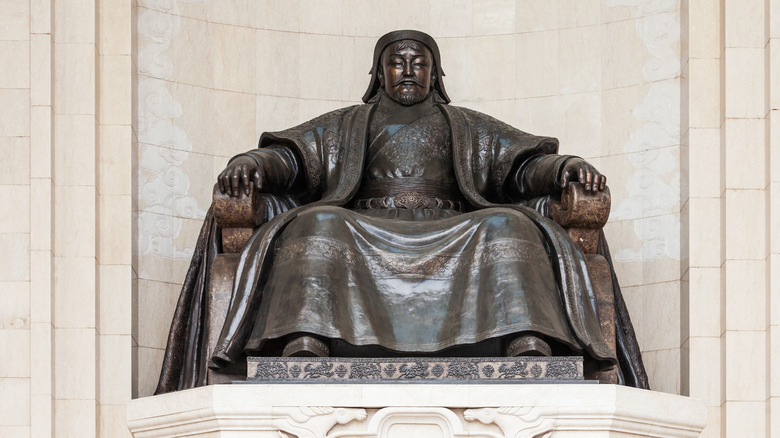How Genghis Khan's Best Friend Became His Mortal Enemy
The idea of two best friends turned to enemies seems like something out of Shakespeare. However, in the case of Genghis Khan, life did imitate art. Genghis Khan was a warlord who lived from 1162-1227. Among his achievements, he unified the tribes of Mongolia and built an empire that extended all the way to the Adriatic Sea in Europe. Genghis Khan's territorial claim was so vast that many historians believe that the Mongol Empire was the largest of all time, per History.
But Genghis Khan wasn't just known for his conquests. He helped usher in a societal transformation throughout Mongolia and Asia. Part of this was through violent means — including widespread genocide that wiped out large portions of the population. But this transformation also included reforms such as offering freedom of religion and, most importantly, instilling a hierarchy based on meritocracy rather than birth. It was this last point that caused the fallout between Genghis Khan and the man and "blood brother" named Jamukha.
The start of an important friendship
The details of this friendship are documented in "The Secret History of the Mongols." This collection of scrolls was written around the time of Genghis Khan's death and provides the most significant account of the warlord's life and achievements, per Encyclopedia Britannica.
According to lore, Genghis Khan and Jamukha first met when they were children when their two clans would visit one another, per "Genghis Khan and the Making of a Modern World." Though Genghis Khan and Jamukha were loosely related, the two came from different worlds. Jamukha came from an aristocratic family, while Genghis Khan, whose real name originally was Temujin, came from a decidedly less regal lineage. Nevertheless, the two forged a relationship and made their first pact of friendship when they were just 11 years old. This included exchanging gifts such as knucklebones and arrowheads.
When they got older, the pair participated in a ritual that actually made them blood brothers, known in Mongol culture as "andas." This included drinking each others' blood, which was seen as an act of sharing souls. The ceremony also had other moving aspects, including vows to each other and eating an unnamed food "that could not be digested" together. The connection created through this ritual was considered one of the strongest a Mongol could make — even stronger than a fraternal bond. While siblings were related by chance, andas were created through free will. Jamukha was the only anda that Temujin would make throughout his life.
The friends face adventure and loss
Since the two men were members of different clans, they were not always together and lived different day-to-day lives. However, disaster struck when Temujin's young wife, Borte, was kidnapped by the rival Merkid tribe, per History Collection. Temujin was worried that his clan would not have the manpower to rescue her and the other victims, so he called on his blood brother for help.
Jamukha was in control of a much larger army than Temujin's, and he was eager to come to his friend's assistance. With the two tribes united, they soundly defeated the Merkid people, with the "Secret History" boasting of an "end of the men and their descendants" (via "Genghis Khan and the Making of a Modern World"). After this major victory, Temujin pledged allegiance to Jamukha, and gave up his previous role as a hunter to become a herder and steppe warrior under his friend.
Moreover, the two men decided to publicly swear allegiance to each other once more. As described in a post on Medium, the vow renewal was a grand ceremony, during which Temujin and Jamukha exchanged their best horses and treasured golden sashes by the edge of a cliff. The two friends also made a promise — "let us love each other" — and followed up their vows with a night of celebration. At the end of the festivities, the pair slept under the same blanket together as brothers.
But cracks started to form in their friendship
Temujin became a herder and steppe warrior under Jamukha and attached his clan to his blood brother's. Though the new role was considered more prestigious and offered Temujin and his family a better lifestyle, it meant taking orders from Jamukha. This soon caused tension. In Mongol culture, men were considered "white bone" or "black bone." The former was the equivalent of blue blood status, while those who were "black bone" were considered inferior. Jamukha was white bone; Temujin was black bone.
According to "The Secret History," as time went on, Jamukha started to treat Temujin with less respect as he placed more emphasis on lineage versus their andas bond. Historians do not know the reason, though they have speculated that this could have been because Khan was more popular among the men in the camp (per "Genghis Khan and the Making of a Modern World"). It was also likely spurred by Temujin's belief in meritocracy. This was considered an insult and threat to the ruling class, which included Jamukha.
Though Temujin chafed at their changing relationship, he finally snapped in the year 1181. Temujin and Jamukha had been leading their men to a new camp, and were riding side-by-side as was their custom. However, Jamukha wanted to assert his dominance and ordered Temujin to take the sheep and goats and camp by the river. Meanwhile, he himself took the horses to camp by the mountains.
The bloody fallout
The message that Jamukha sent was a clear one, and he seemed intent on humiliating Temujin by ordering him to take on inferior and demeaning tasks. Though Temujin debated whether to follow orders, his wife, Borte, urged him to break off and form his own troop. Khan listened, and he and his men fled from the camp in secret during the night. The schism began. The two men grew their clans and embarked on two decades of war against other tribes throughout the steppe as each tried to consolidate power to become the ultimate ruler of the Mongols. However, it was not until 1189 that the two came face to face, and to terrible results.
As described by History Extra, Jamukha not only won the battle, but also seemed intent on showcasing cruelty to Temujin's forces. Most horrifically, he boiled alive Temujin's captured generals — in Mongol tradition, this meant that their souls would be annihilated. "The earth was soaked with the blood of my warriors," wrote Temujin. "Never again would I be defeated and my loyal warriors so dishonored."
Jamukha's cruelty backfired, though. It gave him the reputation of an unfeeling ruler, and many of his men deserted him to join other tribes. Moreover, it motivated Temujin to regroup and claim vengeance. Five years later, in the summer of 1204, Temujin and Jamukha met once again, and this time the "black bone" warlord would emerge victorious.
An emotional ending
Despite Jamukha's cruel treatment of his captives, Temujin still had an emotional attachment to the man he once considered a brother. And so, the famous warlord approached Jamukha with a plea: "Let us be companions. Now, we are joined together once again, we should remind each other of things we have forgotten. Wake each other from our sleep. Even when you went away and were apart from me, you were still my lucky, sworn brother," he said, according to Mongol lore (via Medium).
The plea had a profound effect on Jamukha, and the aristocratic leader allegedly asked his blood brother for forgiveness. However, Jamukha insisted that he himself be killed, per custom. Jamukha believed that his spirit could then protect Temujin, and that dying was the best proof of his loyalty. "Kill me and lay my dead bones in the high ground. Then eternally and forever. I will protect the seed of your seed, and become a blessing for them," Jamukha said.
Though it was not the resolution Temujin had desired, he agreed to the terms. He ended up killing Jamukha by breaking his back — a method seen as the most merciful as it did not spill blood. He also buried his friend with the golden sash they had exchanged decades earlier. Jamukha was the final threat to Temujin's ascendency. With that death, the famed warlord took on the name Genghis Khan, which means "universal ruler," and embarked on creating his mark in history.
